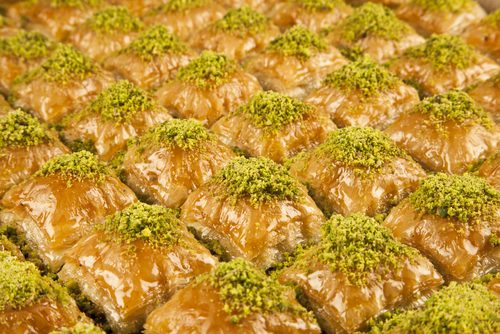Short answer
Yes, Baklava is bad for you. When you deconstruct the modern Ottoman Turkish pastry down its base chemicals, what is left are destructive substances.
Recommended Alternative
Long answer
With a simple crunch of pastry, nuts, and honey, Baklava should be viewed as an indulgence. This traditional dessert can be bought all over the world, with very few people questioning its ingredients due to its freshness. But its sweetness can be a disguise for more worrying effects. Instead of indulging your sweet tooth, find out what actually constitutes your favorite snacks. There are some recipes which should cause alarm rather than cravings. Preservatives can turn Baklava into a permanent regret, especially if consumed over sustained periods of time.
Many large scale Baklava production factories utilize a recipe that contains the additive potassium sorbate. Reports have indicated that potassium sorbate can lead to a downward spiral of ill health, and in extreme cases, disease. Immediate symptoms can include stomach discomfort, such as nausea and diarrhea, which can be very unpleasant. In the short-term, you may also experience skin irritation or rashes. But this may just be the start of your problems. If you have a particularly severe reaction to potassium sorbate, you may have prolonged pain due to liver and kidney problems, with inherent potential for significant damage to your internal organs. In particular, parents of young children should be aware of this risk, and take note of whether potassium sorbate is used in Baklava recipes.
Another disturbing ingredient of Baklava can be calcium propionate. While you may notice headaches, erratic behaviour, or poor sleeping patterns in children-- the negative consequences can be much more severe, and cause much further damage. The build-up of calcium propionate in the gut can also lead to stomach ulcers. This can be painful, and can lead to additional health complications in the digestive system.
Moreover, Baklava contains Vanillin. This vanilla extract additive has been linked to headaches and other allergic reactions associated with the consumption of chemical food preservatives. Maltodextrin is another well-known additive that may be present in Baklava and is linked to dangerous blood sugar spikes. Furthermore, as with all sweets, Baklava is loaded with sugar. Over the long term, this may also lead to inflammation in the body, obesity, tooth decay, with an extremely negative impact on your internal organs.
So, before you over-indulge, take the time to find out exactly which ingredients are in this European treat. With so many questionable preservatives being traced back to a very simple recipe such as Baklava, you should be aware of the health risks, which can be extremely destructive. Whether this affects certain areas of the body or your entire health system, arm yourself with the facts particularly if you have any existing conditions or young children in your care. As with any food product, Baklava should be enjoyed responsibly.
Possible short-term side effects
- stomach pains
- nausea
- diarrhea
- headaches
- rashes
- skin irritation
- sugar rush
- inflammation
Possible long-term side effects
- tooth decay
- obesity
- blood sugar problems
- hypertension
- kidney damage
- liver damage
- sleeping disorders
- stomach ulcers
- type ii diabetes
Ingredients to be aware of

Healthier alternatives
- homemade pastry using organic ingredients and naturally sweet flavorings, such as honey
Our Wellness Pick (what is this?)
Honey Nut Cheerios Medley
- Heart healthy cereal
- Whole grain oats
- Honey nut flavor
- Large size pack
 Approved by
Approved by 















